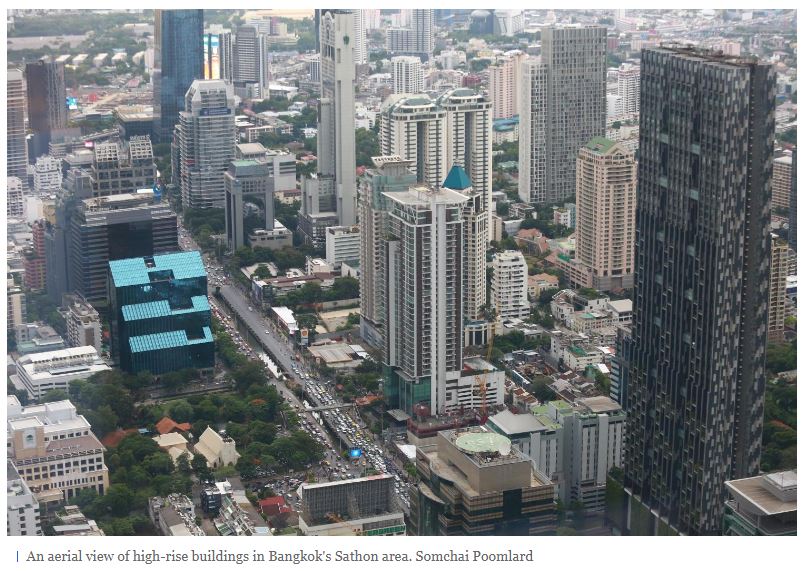Thailand: Restarting the uneven recovery
A potentially bumpy recovery across all sectors of the property market is foreseen as Thailand’s economy weathers another challenging year, according to the international property consultancy CBRE.
Following the pandemic-induced economic storm in 2020, the residential sector will see an uneven recovery in 2021 in the condominium and detached housing markets. Commercial and industrial property markets will experience mixed fortunes as logistics leads the way, the office market will brace for the entry of a lot of new supply planned before the pandemic, and hospitality and retail will lag.
Residential prices realigned: CBRE believes the Bangkok residential market will remain sluggish in 2021 as Covid-19 has put pressure on both domestic and foreign buyers, prolonging purchasing decisions. Limited new launches will be focused mainly on the midtown and suburban areas and affordable segments as prices become more realistic.
Developers will continue to concentrate on their remaining built but unsold inventory, while also looking for opportunities in new areas and ways to improve financial liquidity. Low-rise housing will be the key focus to mitigate risks. There is still demand for condominiums but mostly from buyers with lower budgets. Developers will also shift to smaller-scale projects to reduce investment size and make it easier to secure financing from cautious banks.
“Based on the number of transactions by CBRE in 2020, the selective luxury residential market is still in high demand from both end-user buyers and investors with high purchasing power, especially for branded residences and luxury housing, but decision-making has become longer,” said Aliwassa Pathnadabutr, managing director of CBRE Thailand.
“Supply of large units in the super-luxury segment, where sales have been slow, will become more active. Foreign buyer interest, especially from Chinese investors, remains across all segments but the volume of foreign sales will recover when they can return to the country.”
Offices reshaped: CBRE sees organisations rethinking workplace design and space amid a shift to an employee-centric concept and a hybrid model of traditional office space combined with flexible space and remote working.
“One of CBRE’s key concerns is the amount of future supply in the pipeline,” said Roongrat Veeraparkkaroon, head of advisory and transaction services (offices) with CBRE Thailand.
This year, 334,000 square metres of space is expected to be completed, increasing the total in Bangkok to 9.49 million sq m. Minimal rental growth is also expected.
“The market will shift to a tenants’ market, especially for large tenants that occupy large office spaces,” she said.
Retail reform: The retail industry suffered from a significant decrease in traffic and a decline in consumer confidence in 2020. Landlords will be reconsidering investment plans, with more flexible rental structures for tenants and innovative use of physical space.
Retailers, meanwhile, will resize and reformat rental space to be more cost-effective and agile. Banks are migrating online, F&B will focus on delivery, and fashion stores will become more omnichannel. Apart from changing rental status from permanent to temporary, tenants will develop smaller models such as pop-up stores to retain profitability.
Hospitality refocused: The Bangkok hospitality market took a severe hit last year as tourist arrivals to Thailand plummeted from 40 million in 2019 to less than 7 million in 2020. CBRE predicts the Thai tourism industry will return to its 2019 level in 2022, depending on the success of Covid vaccine roll-outs and the economic recovery of key inbound markets such as China, Russia, Japan and India.
“In the meantime, hotel owners and operators are forced to turn their gaze inward on tourism this year, relying solely on domestic tourists for revenue,” said Rathawat Kuvijitrsuwan, head of research and consulting with CBRE Thailand.
“To survive, CBRE sees hotels coming up with new ways of operating and marketing, from pushing work-from-hotel and staycation packages to special offers for non-guests. Some hotels may choose to open partially or only open for F&B, and newly-completed hotels could use this low-traffic period as a soft opening while keeping operating costs minimal.”
Industrial demand resilient: “The logistics market has proven to be one of the least affected industries as Covid has driven Thai consumers further into the e-commerce and digital economy era, leading to demand for modern logistics property [MLP],” said Adam Bell, head of industrial and logistics with CBRE Thailand.
Over 400,000 sq m of new MLP supply will enter the market within 2021, “the vast majority of which will be in the built-to-suit format”.
Many China-based manufacturers continue to consider relocating production bases to lower-cost Southeast Asia. Investors are increasingly interested in buying factories to have more control over their premises, while developers have slowed speculative development of ready-built factories.
Investment strategies revised: With Covid-19 acting as an accelerant, the property market has become more tenant- and buyer-friendly with occupiers having more bargaining power. More properties are up for sale as landlords and owners put assets on the market to generate cash flow.
CBRE believes this presents a good opportunity for bargain-hunting investors, though the expectation gap between sellers and buyers may remain the key issue. Land prices will become more realistic with relatively flat growth in prime locations. Prices in midtown and suburban areas will generally decrease except in some locations along new mass transit and road routes.
“Landlords and property owners will need to be proactive in asset management to secure their income streams and manage their costs,” said Kulwadee Sawangsri, head of capital markets (investment and land) with CBRE Thailand.
“Every investment should be assessed and reassessed to understand the threat from competitors, how occupier requirements are changing and whether it is time to invest in older assets or exit.”
Source: https://www.bangkokpost.com/business/2062951/restarting-the-uneven-recovery


 Thailand
Thailand




